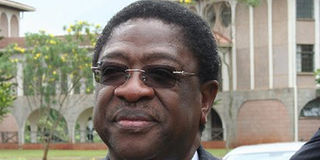Kenya AG to appeal kadhi courts ruling

Attorney General Amos Wako filed a notice to appeal Tuesday against the three-judge bench decision to declare kadhi courts unconstitutional May 25, 2010. Photo/FILE
What you need to know:
- Court rules that decision to include the kadhi courts in the current constitution was an illegality that favoured one religion over others.
Kenya's Attorney General Amos Wako has termed Monday's court ruling on the kadhi courts "unconstitutional".
Mr Wako filed a notice to appeal Tuesday against the three-judge bench decision, which not only declared the inclusion of the courts in the current constitution as unconstitutional but also condemned the use of public funds to support it.
The notice of appeal which was filed by state counsel Antony Ombwayo says: “The AG being dissatisfied with the decision of judges Joseph Nyamu, Roselyne Wendoh and Mathew Anyara Emukule given at Nairobi on May 24 intends to appeal against the whole of the decision for the same was in itself unconstitutional.”
Illegality
In the landmark ruling, the judges sitting as a Constitutional Court, said the decision to include the kadhi courts in the current constitution was an illegality that favoured one religion over others.
However, the judges reserved their decision on whether the provision should be included in the proposed Constitution, which will be subjected to a referendum on August 4.
In a 114-page ruling, the judges held that the enactment and application of kadhis’ courts to areas beyond the 10-mile Coastal strip specified during their establishment in the colonial times is unconstitutional.
“Financial maintenance and support of the kadhi courts from public coffers amounts to segregation, is sectarian, discriminatory and unjust against the applicants and others... it amounts to separate development of one religion and religious practice contrary to the principle of separation of state and religion,” ruled Court of Appeal judge Joseph Nyamu and High Court judges Mathew Anyara Emukule and Roselyne Wendoh.
Public money
Financing the kadhi courts using public money, they said, was contrary to the universal norm and principles of liberty and freedom of religion envisaged under sections 70, 78 and 82 of the Constitution.
And above all, the judges said, even the decision to come up with the Kadhi Courts Act, which extended them beyond former protectorate areas of the Sultanate of Zanzibar, contravened the Constitution. The judges declared the Act null and void.
It further declared section 66 of the Constitution, which introduced the courts, as superfluous.
The section, the judges ruled, infringed on the constitutional rights of a group of 26 religious leaders who went to court to challenge the kadhi courts.
The case was filed in 2004.




